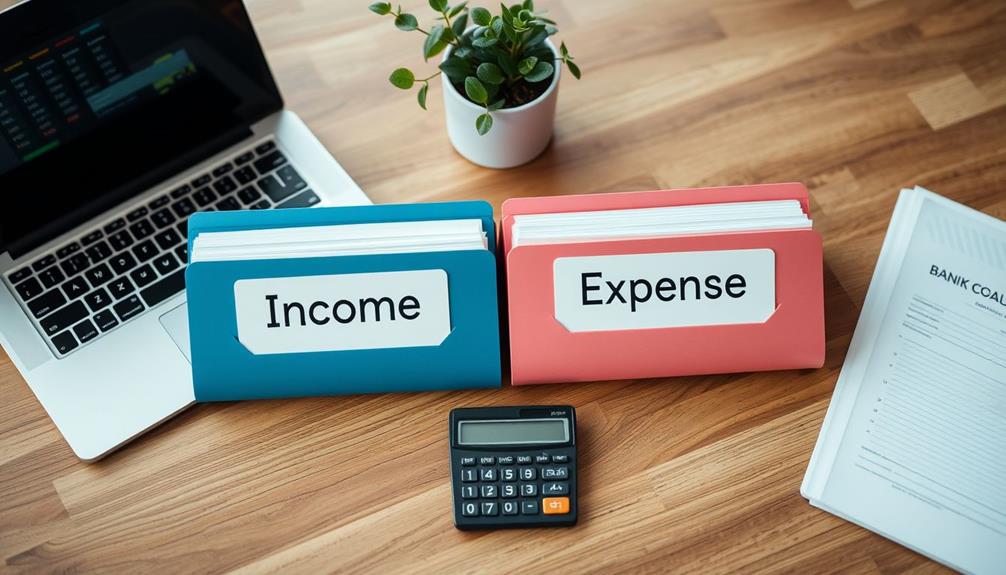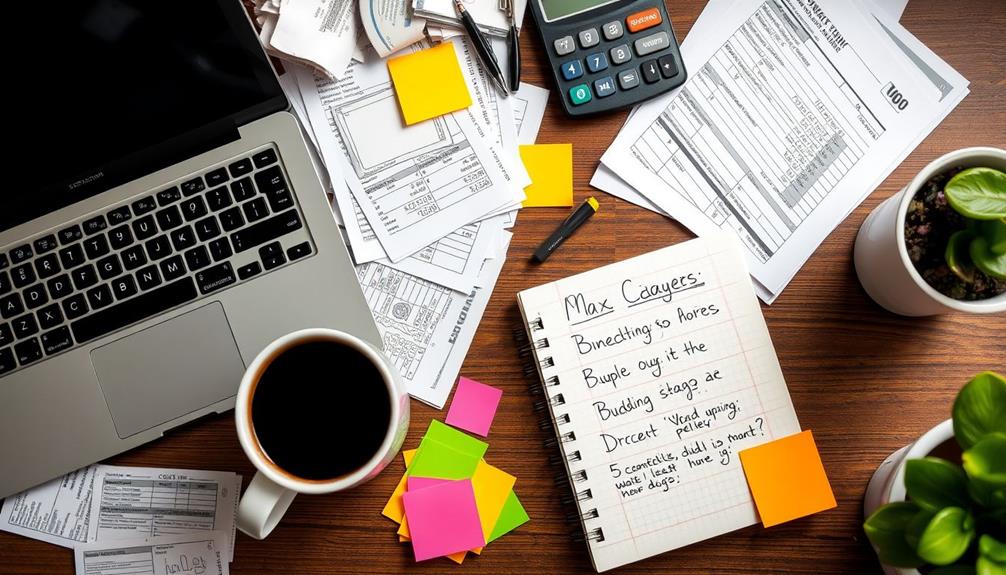Managing irregular income requires thoughtful strategies to maintain financial stability. Start by creating a flexible budget that reflects your fluctuating earnings—try the 50/30/20 rule for effective allocation. Build an emergency fund covering 3-6 months of living expenses and save 20-30% of your income for taxes. Use separate accounts for business and personal finances, which helps with tracking and organization. Consider diversifying your income by exploring different platforms and projects. Finally, stay adaptable and aware of market trends to keep your skills relevant. There's more out there to help you navigate this freelance journey effectively.
Key Takeaways
- Establish a flexible budget using the 50/30/20 rule to manage fluctuating income effectively and allocate funds for needs, wants, and savings.
- Build an emergency fund with 3-6 months of living expenses for freelancers and 9-12 months for gig workers to provide financial stability.
- Set aside 20-30% of your income for taxes to alleviate financial strain during tax season and ensure accurate tax reporting.
- Diversify income streams by exploring multiple freelance platforms and networking to discover new opportunities and enhance earning potential.
- Utilize budgeting apps and financial tracking tools to monitor income and expenses in real-time, promoting informed financial decisions.
Understanding Irregular Income

Irregular income can feel like riding a financial rollercoaster, especially for freelancers and gig workers. With income that fluctuates in amount and frequency, managing finances becomes a real challenge.
According to the Freelancers Union & Upwork, 58% of freelancers face income instability, complicating their budgeting and financial management. Understanding your cash flow is vital; it helps you anticipate lean periods and plan accordingly.
In addition, mental health support is important for those handling financial stress, as it can impact overall well-being and productivity mental health support.
To mitigate the unpredictability of irregular income, establishing a consistent payment schedule with clients can make a significant difference. This approach creates a more reliable cash flow, making it easier to match your income and expenses.
Additionally, building an emergency fund is vital for managing the ups and downs of freelancing. Aim for covering 3-6 months of living expenses, or 9-12 months if you're a gig worker.
Importance of Budgeting

Budgeting is often the backbone of financial stability for freelancers and gig workers. With the unpredictable nature of freelance income, creating a budget is vital to manage your expenses effectively. A flexible budget helps you adjust your financial plans based on your lowest monthly income, guaranteeing you can cover essential expenses even in leaner months.
Exploring risk management strategies can also provide additional security in your financial planning.
Applying the 50/30/20 budgeting rule can simplify this process. Allocate 50% of your income to needs, 30% to wants, and 20% to savings. This balanced approach allows you to navigate the ups and downs of your financial situation without feeling overwhelmed.
Utilizing budgeting apps like Mint or YNAB can further enhance your ability to track your income in real-time. These tools help you monitor monthly expenses and identify spending patterns.
Regularly adjusting your budget based on income fluctuations guarantees you make informed financial decisions.
Incorporating automated transfers can also help you stay on track with savings goals. By following these financial tips for gig workers, you'll build a solid foundation to manage your irregular income and ultimately achieve greater financial stability.
Building an Emergency Fund

Building an emergency fund is essential for freelancers and gig workers, especially given the unpredictable nature of your income.
Given the potential for inconsistent earnings, it's wise to explore best websites to earn money online that can provide additional financial stability.
Ideally, aim to save enough to cover 9-12 months of living expenses, which can help you navigate financial ups and downs.
To get started, consider setting aside a percentage of each paycheck and keep your savings in a high-yield account for easy access and growth.
Importance of Emergency Funds
Having a robust emergency fund is essential for freelancers and gig workers to navigate the unpredictable nature of their income. An emergency fund acts as a financial safety net that can cover 3-6 months of living expenses, ensuring you can meet essential costs like rent, utilities, and groceries during lean periods.
Additionally, having a diversified investment strategy, such as a benefits of converting 401k to Gold IRA, can further enhance your financial security. By saving at least 10% of your earnings in a separate savings account, you can avoid the temptation to dip into this fund for non-emergencies.
This financial cushion greatly reduces stress related to unexpected expenses, allowing you to focus on your work without the anxiety of possible financial instability. When you have an emergency fund, you're better equipped to manage your finances and weather the feast-or-famine cycles that often come with gig work.
Ultimately, building an emergency fund is about achieving financial security and resilience. By preparing for the unexpected, you gain the confidence to take on new opportunities and challenges in your freelance career.
Recommended Savings Amount
Determining how much to save in your emergency fund can feel overwhelming, especially given the unpredictable income that freelancers and gig workers often face. A solid emergency fund is essential for financial security, particularly when dealing with irregular income. Freelancers should aim to save between 3-6 months of living expenses, while gig workers may benefit from saving 9-12 months due to the nature of their income.
Here's a quick guide to help you decide your savings amount:
| Savings Recommendation | Freelancers | Gig Workers |
|---|---|---|
| Minimum Months Saved | 3 | 9 |
| Ideal Months Saved | 6 | 12 |
| Suggested Savings Rate | 10% | 10% |
| Accessibility | Easy | Easy |
| Purpose | Emergency | Emergency |
Regular contributions to your emergency fund should be prioritized. Track your income and allocate a percentage, ideally 10%, from each payment you receive. This disciplined approach to saving will bolster your personal finances and provide peace of mind, enabling you to navigate the gig economy with greater confidence.
Strategies to Build Fund
To effectively build your emergency fund, consider implementing a few strategic approaches that align with your income patterns. Start by aiming to save 3-6 months' worth of living expenses, but as a freelancer or gig worker, it's wise to target 9-12 months due to income variability.
A balanced approach to budgeting can also help manage your finances more effectively, especially if you incorporate elements from holistic lifestyle approaches to improve overall well-being. Opt for a high-yield savings account for your emergency fund. This way, you can earn interest while keeping your funds accessible for unexpected expenses.
Make it a habit to contribute a fixed percentage of your income—ideally 10-20%—during profitable months. This will help you build your emergency fund faster and manage your money more effectively. Setting specific savings goals can also keep you motivated; for example, aim to reach a certain amount by the end of the year.
To guarantee consistent contributions, automate your savings by scheduling a recurring transfer to your emergency fund each month. This automation helps you maintain discipline in saving, regardless of fluctuations in your irregular income.
Setting Up Separate Accounts

How can setting up separate accounts transform your financial management as a freelancer? Establishing a dedicated business checking account allows you to track your income and expenses more accurately, simplifying tax preparation and overall financial management.
By keeping your personal and business finances separate, you prevent the temptation to dip into business funds for personal expenses, promoting greater financial discipline. Furthermore, for freelancers looking to enhance their financial security, considering options like a Gold IRA can be beneficial, as these accounts protect against inflation and market volatility while providing tax benefits during rollover processes Gold IRA Rollovers.
Consider creating a separate savings account specifically for taxes. By setting aside 20-30% of your income, you lessen the financial strain during tax season.
Additionally, having distinct accounts for emergency funds and retirement savings encourages consistent contributions, enhancing your overall financial security.
Implementing a separate account for discretionary spending can also help. This approach clearly defines how much you can allocate for non-essential expenses, making it easier to manage your irregular income without overspending.
With organized records from these separate bank accounts, you'll find it simpler to monitor your business expenses and stay on top of your financial health. Overall, setting up these accounts not only streamlines your money management but also prepares you for future financial challenges.
Strategies for Tax Management

Managing taxes effectively is vital for freelancers, given the irregular income they often face. As the demand for AI Training Jobs Entry Level continues to grow, many freelancers may find themselves steering through new income streams.
To avoid financial strain during tax season, set aside at least 20-30% of your income for tax obligations. This proactive approach helps you handle your tax payments comfortably. Since estimated taxes for self-employed individuals are typically paid quarterly, staying organized is important.
Use financial tracking apps to monitor your earnings and expenses throughout the year. This won't only save time but also simplify tax preparation, making it easier to calculate your tax liabilities.
Maintaining accurate records guarantees you can report your income taxes accurately, helping you avoid any surprises.
Consider investing in accounting software to streamline your financial tracking. It can help you categorize your expenses and income, making sure you don't miss any potential deductions.
If you're unsure about your specific tax obligations or how to optimize your deductions, consulting with a tax professional can provide valuable insights.
Diversifying Income Streams

Freelancers often face unpredictable income, so diversifying income streams can be a smart strategy to create more financial stability. By combining freelance work with side gigs or passive income sources, you can reduce reliance on a single paycheck and mitigate the risks associated with income volatility.
Exploring investments like a Gold IRA can be beneficial for securing your financial future, especially in times of economic uncertainty, as seen in Noble Gold's offerings. Additionally, consider multiple platforms like Upwork, Fiverr, and Freelancer to showcase your skills and tap into various markets, ultimately increasing your client base.
Engaging in different types of freelance projects—such as writing, graphic design, and consulting—enhances your income potential and provides a buffer during leaner periods in any one area. Networking with other freelancers can lead to collaborative opportunities, referrals, and access to projects that may not be publicly advertised, further contributing to your income diversification.
Continuously assess market demand to identify emerging trends and pivot your services accordingly. By staying adaptable, you can guarantee you remain competitive and responsive to changing client needs.
Frequently Asked Questions
How Do You Deal With Inconsistent Income?
You can tackle inconsistent income by budgeting for your lowest earnings, setting aside funds for taxes, creating an emergency fund, diversifying income sources, and regularly adjusting your budget to meet your financial goals.
How Do You Pay Yourself a Salary With an Irregular Income?
To pay yourself a salary with irregular income, first determine your essential monthly expenses. Then, analyze your average income, set a fixed payment schedule, and regularly adjust to maintain financial stability without jeopardizing your cash flow.
How Do You Budget With an Irregular Income?
To budget with irregular income, track your earnings over several months, create a flexible budget, prioritize essential expenses, and set aside funds for taxes. Regularly adjust your budget to reflect fluctuations and maintain financial stability.
How to Manage Finances as a Freelancer?
Managing finances as a freelancer's like juggling flaming swords—exciting, but risky! You've gotta budget wisely, stash away for taxes, and build an emergency fund. Don't forget to track your income like a hawk, too!
Conclusion
Managing irregular income might feel like juggling flaming swords while riding a unicycle, but you can master it! By budgeting wisely, building that oh-so-essential emergency fund, and diversifying your income streams, you'll transform your financial chaos into a symphony of stability. Don't forget about tax management—it's like a secret sauce for your financial success! Embrace these strategies, and you'll be sailing smoothly on the waves of gig work, rather than floundering in a sea of uncertainty!










